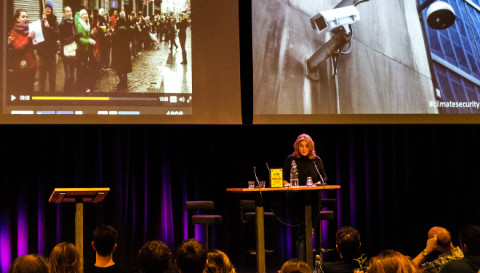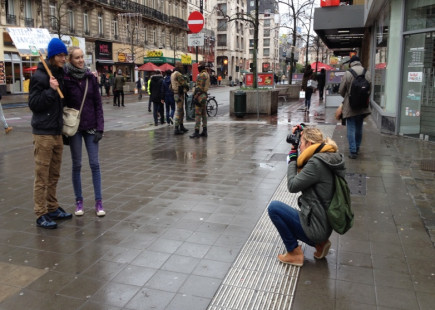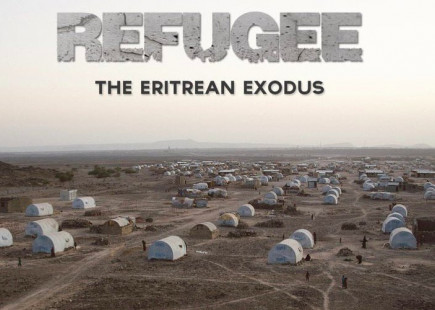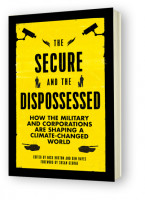The future of the European Union in the context of climate change and refugees
Topics
Mirjam van Reisen discusses the relationship between climate change, anti-terrorism, refugees and security crises, in occasion of the launch of the book "The Secure and the Dispossessed".

Daniel Chavez
Presentation given at the event The Secure and the Dispossessed in Amsterdam 1st December
An Appointment with HistoryI am a proud mum.
One of my daughters, who is sixteen, has joined me tonight. Being sixteen, she will be horrified that I refer to her. She could be studying many things she loves: music, literature, poetry, but she is specialising in environmental systems. I presume that this is the result of a deeply felt uncertainty about the future of humankind. The existential question of existence is no longer an individual, psychological one, in the sense of Freud or Sartre, but it has become very real and collective. “There is no Planet B”, we chanted last Saturday in Brussels. It must be a frightening awakening for any young person now maturing into adulthood with this realisation.
My other daughter, just eighteen, is a young volunteer supporting refugees arriving in Brussels. She gets up at 5 am once a week to provide sandwiches to the refugees waiting and trying to get the papers which allow them to receive temporary shelter. The authorities have reduced the speed of providing papers and refugees, including women and children, who have spent the nights on the street, increasingly cold, windy and wet. The refugees were left unattended as Brussels authorities called for the highest Level Four Security in response to threats linked to the 13 November Paris Attacks and the ensuing crisis in Brussels in response to alleged security threats from 20 November onwards. As government offices were closed the situation on the refugees further tightened, and the next Friday my daughter went to provide breakfast, the volunteers and the refugees were harassed by the police. In addition to the traumatising situation of trying to help the refugees the young volunteers were completely confused by the harassment of the police.

My girls had both planned to go to Paris for the demonstration to make their concerns heard at the Climate Summit. Once this was cancelled by the authorities, they were planning to join the demonstration in Brussels, which was then also cancelled and moved to Oostende. They then organised to go to Oostende where the demonstration was again cancelled. On Sunday organisations defied banning orders. A human chain was formed in Brussels and an extraordinary combination of social and green activists were protected by a human chain of civilians, amongst an unusual show of military presence and force. Young people were carrying “Change the System not the Climate” and “It is Level Four for Climate” on boards. I met young people, members of the Climate Generation, and was surprised that they came out for a demonstration defying orders and authorities. “Social and Climate” versus “Security and Terrorism” was another message and “Red is Green”. The Climate Generation has indeed an appointment with History.
This is a tipping point where Naomi Klein’s Shock Capitalism has become a common notion.
The increasingly rapidly emerging crises of Refugees, Anti-Terrorism, Security and Climate are following each other so frequently and fast that they are now indeed experienced as one and the same crisis. A rough awakening, as each of the challenges seem already hopelessly difficult to resolve, and in their combination the challenges seem unsurmountable. It is our task as activists and intellectuals to help understand how these crises are related and what the entry points are to resolving them. The book by Nick Huxton and Ben Hayes, “The Secure and the Dispossesed. How the Military and Corporations are Shaping a Climate-Changed World”, is a relevant contribution to provide better understanding of these relations.
Let me contribute to highlight a number of pertinent questions concerning the European Union response to the refugee crisis.
For this presentation, I was asked to address to the following question:
How is Europe going to deal with millions of future climate refugees if we can’t even cope with the current arrivals from Syria?
Current arrivals of Refugees in Europe
It is a mistake to project an expectation of increasing numbers of refugees based on the connection between security, anti-terrorism, refugees and climate change in the future. These connections are already underlying current trends of increasing refugee numbers.
In 2014 Researchers of the Dutch Radboud University of Nijmegen published new research which concluded that “The long drought that gripped Syria from 2006 through 2010 was a trigger of the conflict that has torn the country apart with devastating consequences.” A Researcher Francesca de Châtel explained that “it was not the drought per se, but rather the government’s failure to respond to the ensuing humanitarian crisis that formed one of the triggers of the uprising, feeding a discontent that had long been simmering in rural areas.”B The mismanagement of water policy, in relation to overambitious agriculture and overgrazing, in combination with climate change and aggravated by a culture of secrecy with regards to policies on water, have spurred dissatisfaction, unrest, poverty and this has exacerbated the political conflict and refugee crisis.
Similarly, the crisis in Darfur has been linked to climate change and so has the crisis in Mali – with increasing scarcity of water raising tensions between pastoralist and agricultural communities. Researchers such as Marshall Burke have linked conflict to climate change induced agriculture and livelihood problems exacerbating poverty and tension.
The current Refugee Crisis is therefore already a result of the problems arising at the nexus of climate change policies invoking conflict and insecurity. Calling it a ‘crisis’ is an exaggeration in so far that the numbers do not match those of refugee communities supported elsewhere in the world (60 million) under much less favourable circumstances1. As a crisis it is also exaggerated because we have the means to offer protection. If the 33.496 asylumseekers that arrived in the Netherlands in 20152 were to be spread over the 393 Dutch communes, this amounts to just over 85 migrants per commune. This can hardly be labelled a ‘crisis’. So the question is, what constitutes the crisis?
The Secure and the Dispossessed
The title of the book presented here today is pointing to a key issues which has dominated climate change responses so far. This is the assumption that some are more entitled to be secure than others. It is often sold as ‘realism’, but this has become untenable today.
I remember participating in a debate organised by the Group of African, Pacific and Caribbean countries in 2012. A panellist argued that negotiations should be held with Australia to accept the inhabitants of the Pacific island who would be extinct with 2% sea level rise. The argument was that Australia had sufficient space and that realistically a 2% level rise was unavoidable. This perhaps realist but cynical perspective shocked me at the time, as the speaker demonstrated no concern for the importance to attempt to save and protect livelihoods, culture and social structures threatened by climate change. Only three years later, to date, wo know that not only has Australia offered no hospitality to climate change refugees, but is generally exporting any refugees onto islands in the Pacific. The question is not one of space, but it is indeed a deep rift between the Secure and the Dispossessed.

A clear picture is the one of the Afar refugee camp in Ethiopia. The Afar are a pastoralist group in the Horn, and many have fled the cruel Eritrean dictatorship which has undermined the resilience of these people who for centuries have been able to survive in extremely arid environments. This here (below) is a picture of the camp where the Afar now live, no water, not one strip of green. Dispossessed they now live in the desert as refugees, robbed from their livelihood and dignity.
The Refugee Convention and Climate Change
The 1951 Refugee Convention originates from the experience of dispossession, statelessness and war as a joint cause for refugees. The Convention requires governments to protect all those who are persecuted. The evolution of persecution and dispossession being linked to persecution will require further conceptualisation in the coming period. Already international law has been expanded to address environmental concerns on the basis of the human rights framework. Often these cases have also started with refugees or Internally Displaced People, who being vulnerable to exploitation, became victim of environmental negligence of the authorities.
An in-depth analysis of the settlement Ömerli in Istanbul by by researcher Farida Shaik presents the need for understanding of the inter-relations of problems:
The problems (..) are multi-factorial – economic, social, cultural, environmental. But the Turkish authorities’ approach can be typically categorised as that of “administrative rationalism”, where each symptom arising from these inter-related problems is treated as the problem itself. The Turkish context is one featuring Islamic and secular ideologies pitted against one another, and political exploitation of these differences. Corruption is also pervasive in politics and society. Each of these contextual flaws contributes to the undermining of the administrative rationalist approach to governance, and is a key determinant of policy outcomes. Planning laws exist, as do those pertaining to environmental protection, but the on-the-ground realities, as illustrated at Ömerli, are no reflection of these.3
The relationship between dispossession, marginalization and growing inequality in the context of climate change, security and military policies and refugee streams needs to be understood at local level, in regions, but also at international level.
The definition of refugees in the Geneva Convention pertains to the combination of dispossession and oppression, as a legitimate basis to receive protection. Current attempts to limit the definition of refugees to the realm of the political only violates the origin of the Refugee Convention which recognizes the multifaceted circumstances that create the kind of insecurity that motivates refugees to request protection. Europe has a responsibility to provide protection to refugees, including the current new generation of climate and conflict refugees. At the same time Europe would do well to tackle the root causes leading to the current instability.
What Europe needs to to
A symptomatic way of addressing these issues is not the way forward. In the budgets made available to address climate change and support refugees the resources are systematically taken from the development budgets. The development budgets are increasingly linked to back-stopping of immediate crises, and linked to security measures to deal with the emergencies. The example of the Ebola crisis makes this very clear. The crisis would have been dealt with if simple health clinics would have been available in rural areas. The lack of such services causes the crisis to grow out of hand and an expensive international and military operation was needed to get the crisis under control. Now that Ebola is under control the emergency organisations have moved to firefight the next crisis. Rather than firefighting, development must contribute to a social and economic fabric that is inclusive and that supports the dispossessed to find a way into society and to organise countervailing power as a way of supporting their livelihoods.
In order to facilitate this, development budgets must be maintained and it is therefore of utmost importance that climate finance remains new and additional. A similar target must be set for the support to refugees within the European Union, which should also come from new and additional finance.
The EU Lisbon Treaty rightly targets development policy to the eradication of poverty. The language of the Treaty is cognisant of the reality that dispossession and violations of human rights are linked. This is the reason that those most marginalised are the first to become victims of Climate Change related disasters. The EU and its member states must maintain development budgets, and provide new and additional Climate funding and funding to support the refugees to ensure that not only the symptoms but also root causes are addressed. This will replace the current normality of crisis to a new normality of sustainability, adaptability and stability.
The urgency of the problems in Europe is not financial or economic. Today we must ask ourselves in earnest whether refugee children will die this winter at Europe’s borders. Europe’s main problem is an erosion of the believe in its core values. The security crisis is only serving to erode these values further. The fences to isolate Greece to control the migration into Europe is deeply shameful. The ideas of a core European Schengen group does not help to build the much needed solidarity and belief in European values of inclusion, solidarity and dignity.
Fortunately the Climate Generation is waking up. The future of this planet rests on those who believe that the earth can only be saved if there is a place for everyone.
Thank you.
A. http://ens-newswire.com/2014/02/28/assad-regimes-drought-response-trigg…
B. http://ens-newswire.com/2014/02/28/assad-regimes-drought-response-trigg…
1 In 2014: http://www.vluchtelingenwerk.nl/sites/public/Vluchtelingenwerk/Cijfers/…
2 Cijfers tot en met Oktober, vluchtelingenwerk: http://www.vluchtelingenwerk.nl/feiten-cijfers/cijfers/bescherming-nede…
3 Working Paper No. 122 ISSN 1474-3280 Squatters, Bureaucrats, and politicians: Conflict between environment and development in Ömerli Watershed, Istanbul, ISTANBUL Farida Shaikh 2003 Development Planning Unit University College London
